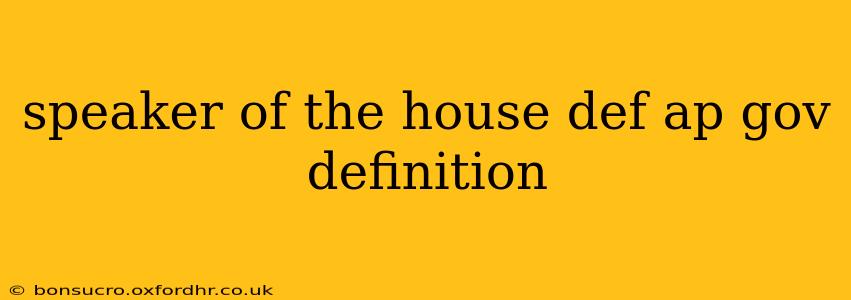The Speaker of the House is a pivotal figure in the U.S. government, wielding significant power and influence within the legislative branch. Understanding their role goes beyond a simple definition; it requires examining their constitutional authority, their practical influence, and their historical impact on American politics. This comprehensive guide will dissect the position, exploring its nuances and complexities.
Defining the Speaker of the House: More Than Just a Presiding Officer
The most basic definition of the Speaker of the House, according to the U.S. Constitution, is the presiding officer of the House of Representatives. However, this simplistic description severely undersells the true power and influence the position holds. The Speaker's responsibilities extend far beyond maintaining order during debates and recognizing members to speak. They are, in essence, the leader of the House's majority party and a key player in the national political landscape.
Constitutional Authority: The Foundation of Power
While the Constitution mentions the Speaker's role in presiding over the House, it doesn't explicitly detail the extent of their power. This lack of explicit detail has allowed the position to evolve significantly over time, accumulating influence through precedent, custom, and legislative maneuvering. The Speaker's core constitutional duties include:
- Presiding over House sessions: Maintaining order, recognizing speakers, and ruling on points of order.
- Appointing committee members: A crucial aspect of shaping legislative agendas and influencing the direction of bills.
- Referring bills to committees: The Speaker's decisions on which committees consider which bills dramatically affect a bill's fate.
- Influencing legislative agendas: The Speaker's power allows them to prioritize certain legislation, effectively setting the House's agenda.
Beyond the Constitution: The Speaker's Practical Power
The Speaker's actual power significantly surpasses their constitutional mandates. This stems from their control over the House's internal operations and their role as the leader of the majority party. Their practical influence includes:
- Control over committee assignments: This power enables the Speaker to reward loyalists and strategically place members to influence legislative outcomes.
- Power to appoint committee chairs: Committee chairs wield considerable power within their respective committees, making the Speaker's appointment choices highly consequential.
- Influence over the legislative process: The Speaker can expedite or delay the passage of bills, significantly impacting their chances of success.
- Party leadership role: The Speaker is the face of the majority party in the House, shaping the party's strategy and guiding its members.
- Public speaking platform: The Speaker enjoys a high profile, frequently speaking to the nation on behalf of the House and their party.
Historical Context: Shaping the Speakership
The role of the Speaker has evolved considerably throughout American history. Early Speakers held less power, but their influence steadily grew over time, particularly during periods of divided government or strong partisan leadership. Examining historical examples – from Henry Clay's influence in the early 19th century to the modern era – reveals the dynamic nature of this position and its impact on national policy.
Conclusion: Understanding the Speaker's Enduring Importance
The Speaker of the House is far more than a mere presiding officer. Their constitutional authority, combined with their practical influence and historical impact, solidifies their position as a critical figure in American politics. Understanding the complexities of their role is crucial to comprehending the dynamics of the legislative process and the broader political landscape. Further research into specific Speakers and their actions throughout history can illuminate the significant influence this office holds in shaping national policy and the direction of the nation.
